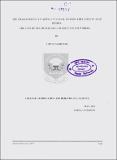| dc.description.abstract | The general objective of this study was to assess the challenges of out-of-school children in Afar
region. To achieve this objective the study employed a case study design using qualitative
methods. The study was carried out in one simple randomly selected Woreda of Zone One. All 45
participants, 16 parents, 12 children, 14 Parent Teacher Associations, 2 regional education
officials and 1 woreda education official were also involved in the study for focus group
discussion, semi-structured interview through simple random and purposive sampling techniques
respectively. Focus group discussion and semi-structured interview was the main instrument of
data collection. Document analysis and observation were also utilized to substantiate the data
obtained through focus group discussion and semi-structured interview. Using the theory of
social exclusion and the right-based approach to education, the study selected two social
groups; rural and urban. It analyzed how differences in social, economic as well as political
circumstances between the groups continue to reinforce the exclusion of children from
education. The finding of this study indicate that the two social groups have group-specific
factors which explain why their children are excluded from education. The children from the
rural group experience four forms of disadvantages: the provision of education which is mainly
focused on school-based approach, luck of parents awareness on the importance of education,
relevance of the curriculum to their linguistic and cultural reality and disparity in the provision
of education among the kebele 's that prevent the full participation. of the rural group. Parents
from the urban group, on the other hand, managed to send some of their children to school while
keeping others at home. This group appears to be excluded due to factors, such as : Economic
circumstance, inability to pay the contribution imposed on parents as a registration fee in an ad
hoc manner for some households who have low income resources and large family members,
Lack of curriculum relevance. The study argues that the provision of education should be flexible
which take into account the socio-economic, linguistic and cultural reality of the pastoral
community, and more focus should be needed to be given for demand-side factors. | en |


